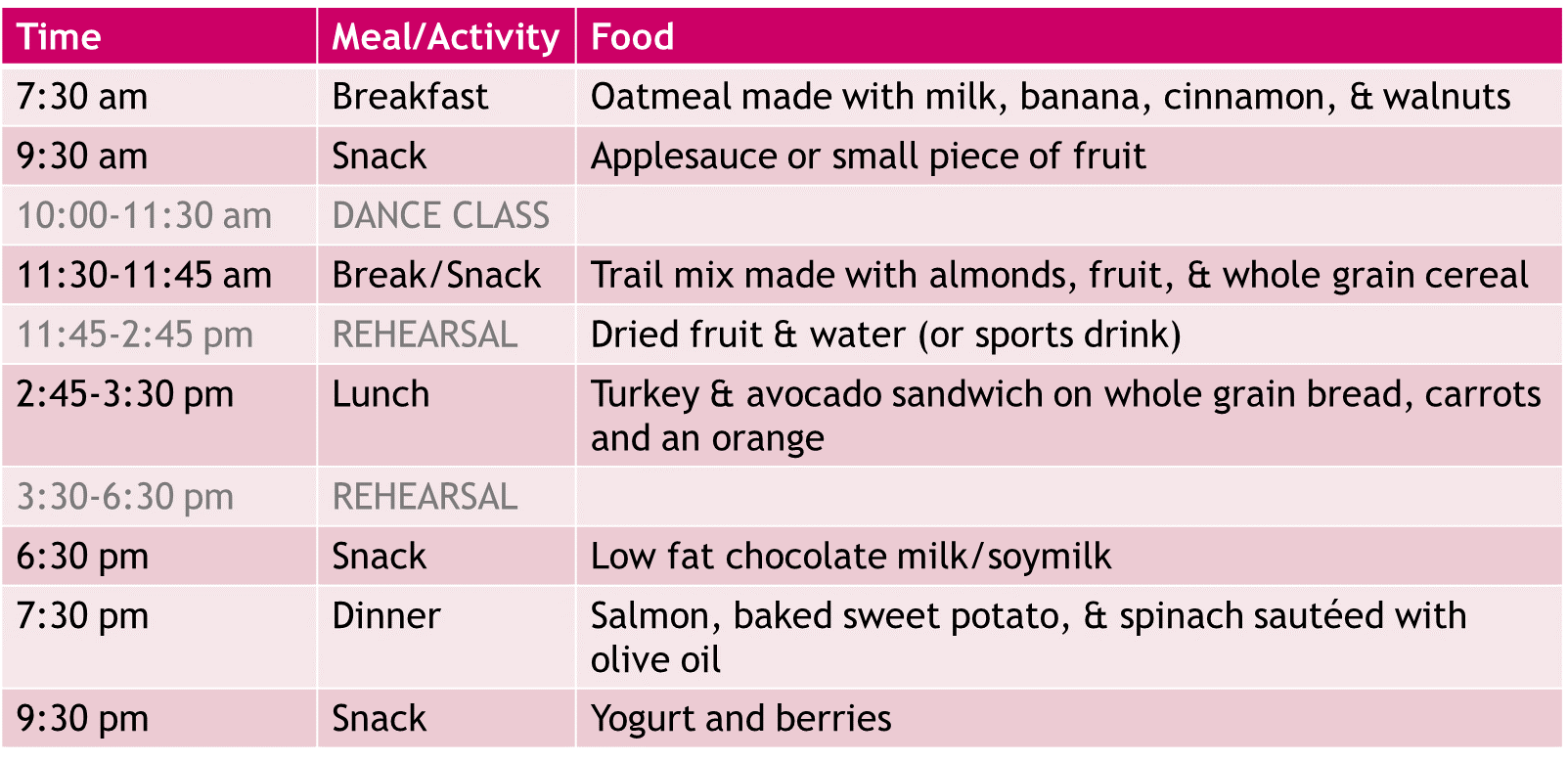 I love this time of year when the weather turns cool and fall dance season is in full swing. As I spend my time off trying to see as many dance performances as possible, my time in the office is spent helping my dancer clients fine tune their nutrition habits for this busy dance season.
I love this time of year when the weather turns cool and fall dance season is in full swing. As I spend my time off trying to see as many dance performances as possible, my time in the office is spent helping my dancer clients fine tune their nutrition habits for this busy dance season.
What you eat and when you eat can have a big impact on your energy, focus, endurance, and recovery. Here are my nutrition tips to help you perform at your peak this season and beyond.
Let’s start with a refresher on what you need to eat and why:
Enough energy (aka calories)
Undereating can have serious consequences like decreased strength and stamina and increased risk of injury. Dancers need to consume enough energy for classes, rehearsals, performances, and the activities of day-to-day life.
Good sources: Aim to get most of your energy from nutritious choices like whole grains, lean protein, low-fat dairy, fruit, vegetables, and healthy fats. But remember, the goal is to eat a mostly healthy diet, not to be perfect.
Carbohydrates (aka carbs)
Carbohydrates are the main source of energy for your brain and muscles. Eating the right amount of carbs will help keep your energy and focus up during class, rehearsals, and performances.
Good sources: Whole grains (such as whole wheat bread, brown rice, whole grain pasta, oats), quinoa, starchy vegetables (corn, peas, potatoes), beans/legumes, fruit, milk, and yogurt
Protein
Protein is necessary for muscle growth, strength, repair, and recovery and for your metabolism and immune system to work properly.
Good sources: Meat, poultry, fish, tofu (and other soy foods), seitan, dairy (milk, cheese, yogurt), eggs, nuts, seeds, beans/legumes
Fat
Fat is needed for normal brain and nerve functioning, regulating body temperature, and hormone production (which plays a role in bone health). Fat provides an additional source of fuel for the muscles and helps us absorb fat soluble vitamins (vitamins A, D, E, K).
Good sources: Nuts, seeds, avocado, olive oil, canola oil, fatty fish (like salmon)
Vitamins and Minerals
Dancers can usually get the vitamins and minerals they need by eating a well-balanced diet that provides enough energy and includes a variety of fruits and vegetables. Dancers with food allergies and/or restricted diets (for example, vegans) may need to take supplements. Here are three vitamins and minerals that are especially important for dancer health:
Calcium & Vitamin D are needed for good bone health. Calcium is found in dairy (milk, cheese, yogurt), soy products, collard greens, and almond butter. Fatty fish (like salmon) and fortified foods (like dairy and plant milks) provide some vitamin D, but there aren’t many good food sources of this important vitamin. The best source of vitamin D is sun exposure. Many dancers don’t get enough vitamin D and may need to take a supplement.
Iron helps make red blood cells which bring oxygen to the muscles. Iron is found in red meat, fortified grains, beans/legumes, and spinach. The iron in vegetarian foods is better absorbed when eaten with vitamin C rich foods (like citrus).
Fluid
Staying well hydrated is important for dancers because even slight dehydration can negatively affect concentration and performance. Fluid needs vary based on factors such as age, gender, activity level, sweat rate, and environment. To meet fluid needs, dancers should drink liberally before dancing and during breaks and meals, as well as sip fluids throughout classes and rehearsals. Water is usually best, though sports drinks (like Gatorade, Powerade, etc) may be helpful for dancers with high energy needs, heavy sweating, or long periods of intense dancing without enough break time to eat solid food.
When to eat: How to use meal timing to optimize performance and recovery
Pre-Dance
3-4 hours before: Eat a well-balanced meal including carbohydrate, protein, and fat.
Example: turkey and avocado sandwich on whole grain bread with an apple
30-60 minutes before rehearsal or a performance: Have a carbohydrate-rich, easy to digest snack to top off your energy stores.
Examples: fresh or dried fruit, applesauce, sports drink
Bonus TIP: As you get closer to the time you will be dancing, choose foods low in fat and fiber (both slow down digestion and may cause stomach upset). Use rehearsals to practice your pre-show meals and snacks – it’s not a good idea to try new foods or drinks on the day of a performance!
During Dance
You may need extra fuel during long rehearsals, performances, or days with many hours of intense dancing. Taking frequent bites of easy to digest, carbohydrate-rich foods or sipping on a sports drink can help keep your energy levels up.
Examples: dried fruit, clementine segments, applesauce, pretzels
After Dance
Within 30-60 minutes after you finish dancing: Have a snack or meal that includes carbohydrate and protein. Carbs replenish the muscle fuel you used while dancing, and protein is needed for muscle repair and recovery.
Snack examples: low-fat chocolate milk, protein and fruit smoothie, apple and peanut butter
Bonus TIP: Include antioxidants (found in brightly colored fruits and veggies like red peppers, broccoli, berries, spinach, & carrots) and anti-inflammatory omega-3 fats (found in salmon, tuna, ground flaxseed, & walnuts) in your post-dance meal to help with recovery.
Putting it all together: Sample dancer meal plan for a rehearsal day*
 *Portion sizes vary based on individual needs
*Portion sizes vary based on individual needs




Share your thoughts